4.9 Rating
Google REVIEWS
Leaders in Georgia Personal Injury Law Since 1995
Georgia Railroad Crossing Accident Lawyer
In the distressing time following a railroad crossing crash, a Georgia railroad crossing accident lawyer like Scholle Law is your advocate, poised to tackle the complexities of your case. Understandably, you want clear answers and a steadfast ally who can claim the compensation you’re entitled to without delay. This article sheds light on how these specialized lawyers can be your pillar of support, emphasizing the swift action and tailored expertise they bring to your side, without any convoluted legal speak.
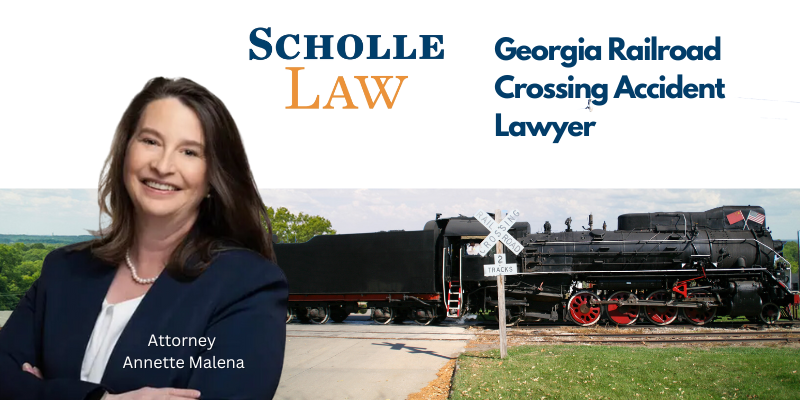
Key Takeaways
- Specialized Georgia railroad crossing accident lawyers are essential for navigating complex legal processes, investigating claims, proving negligence, and understanding state-specific laws and regulations.
- Common causes of railroad crossing accidents in Georgia include equipment failures, human error, poor maintenance, and infrastructure designs, with potentially liable parties including drivers, train operators, companies, manufacturers, track owners, and government entities.
- Victims of railroad crossing accidents in Georgia are entitled to seek both economic and non-economic damages for losses incurred, and should take immediate steps post-accident such as seeking medical care, documenting the scene, and consulting with a specialized accident attorney.
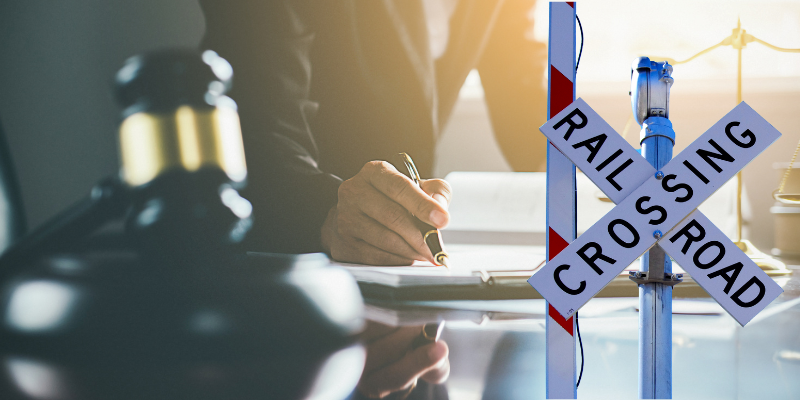
The Importance of Hiring a Georgia Railroad Crossing Accident Lawyer
If you or a loved one has been involved in a railroad crossing accident, the aftermath can be overwhelming. Amid coping with injuries and emotional trauma, there’s the looming legal battle for rightful compensation. That’s where the expertise of a seasoned railroad accident lawyer comes into play, acting as your champion in the complex legal landscape.
Lawyers specializing in railroad accidents can provide the following services:
- Handling transportation company litigation
- Meticulously investigating your case
- Collecting evidence
- Convincingly proving negligence
Their keen understanding of Georgia-specific legal intricacies ensures that your case is handled with expertise.
Experience with Georgia Laws and Regulations
Georgia, like every state, has its own unique set of laws and regulations pertaining to railroad crossings. Therefore, it’s essential to have legal representation that’s intimately familiar with these specificities. The attorneys at Scholle Law possess a comprehensive understanding of how liability is determined and the nuances of negligence in Georgia train accidents, setting a critical foundation for your legal case.
Furthermore, our lawyers are well-versed in the roles and regulations of entities like the Georgia Public Service Commission, which oversees railroad safety. Our familiarity with legal precedents and outcomes of past train accident cases in Georgia assists in predicting and strategizing for current cases, providing you with the best possible legal representation.
Navigating Complex Legal Processes
Navigating through the complex legal processes after a railroad crossing accident can be daunting. But with an experienced railroad crossing accident attorney like Scholle Law, you are ensured of:
- A meticulous approach towards gathering facts
- Lining up expert witnesses
- Conducting interviews
- Initiating an immediate investigation at the accident site
Determining liability in a train accident is a complex endeavor that necessitates extensive investigation and collaboration with seasoned lawyers and experts. Acting within the first 1-2 weeks after a railroad crossing accident is critical, reinforcing the importance of promptly hiring an attorney well-versed in railway regulations.
Common Causes of Railroad Crossing Accidents in Georgia
Railroad crossing accidents are often the result of a combination of factors. In Georgia, the most frequent causes are equipment failure, human error, and poor maintenance. Faulty railroad crossing equipment, including gates and signals, as well as poorly maintained or designed crossings with steep angles, can cause vehicles to become stuck on the tracks, leading to dangerous accidents.
Moreover, train accidents often occur due to:
- train operators’ errors, with companies potentially being liable for these incidents stemming from operational and maintenance failures
- poorly maintained vehicles breaking down on the tracks
- mechanical failures, especially in older vehicles, playing a significant role in causing railroad crossing accidents.
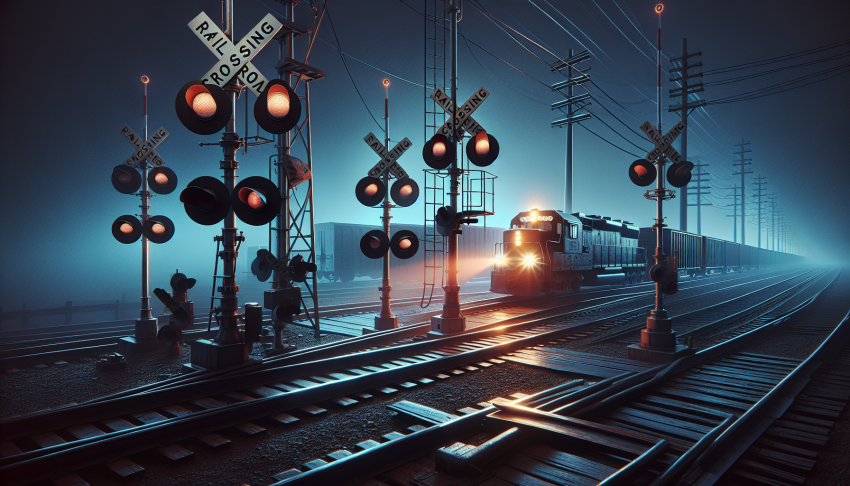
Equipment Failure and Malfunction
Equipment failure and malfunction at railroad crossings, such as a railway crossing, can significantly increase the risk of accidents at railway crossings. Over 60 percent of railroad accidents with motorists involve ‘passive’ crossings that lack adequate warning signs or guardrails.
Train companies may be held liable for accidents if a failure in the train’s critical components, such as brakes or lights, contributed to the accident’s severity. Similarly, government entities can be subject to liability if an accident is found to be a result of poorly maintained or malfunctioning signals and barriers at railroad crossings.
Human Error and Negligence
Human error and negligence play a significant role in railroad crossing accidents. For instance, negligence in railroad crossing accidents can result in severe injury or fatality. Train operators’ delayed responses due to trains’ inability to stop quickly can lead to accidents, especially if the operator fails to maintain safe speeds or communicate effectively.
Inadequate decision-making by drivers, such as speeding or ignoring crossing signals, often results in crashes with trains. Similarly, driver impatience and miscalculated risks can result in fatal encounters. Vehicles that are older or poorly maintained can experience mechanical failures at railroad crossings, thereby creating hazardous conditions that can lead to accidents.
Poor Maintenance and Infrastructure
Poor maintenance and infrastructure also contribute significantly to railroad crossing accidents. Government authorities, including the Federal Railroad Administration, in Georgia are tasked with enforcing regulations to maintain proper functionality and safety of trains and tracks, which includes routine maintenance and inspections.
Government entities have a responsibility to ensure that railroad crossings are equipped with adequate visibility and warning systems. Failure to do so can result in them being held liable for accidents. Unsafe railroad crossing conditions, particularly those with steep approaches, contribute to collision risks, highlighting flaws in infrastructure design.
Poorly designed or maintained railroad crossings, especially passive ones lacking safety features like lights or guardrails, can result in government entities being legally responsible for resulting accidents.
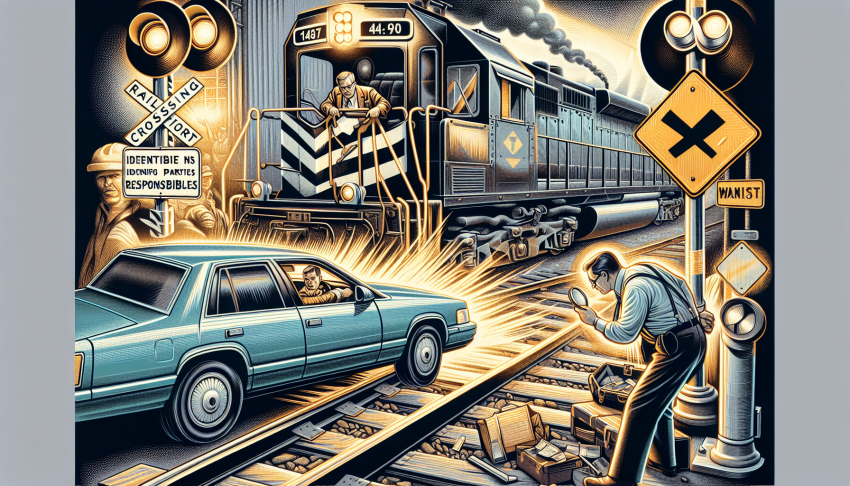
Identifying Liable Parties in Railroad Crossing Accident Cases
In railroad crossing accident cases, several parties may be potentially liable. These include:
- The car’s driver
- The train operator
- The company operating the train
- The train manufacturer
- The track owner
- The governmental entity where the accident occurred
Evidence such as video recordings and eyewitness accounts is critical in determining liability and understanding the chain of events leading to a railroad crossing accident. Our attorneys often consult with industry experts to scrutinize maintenance records and practices, which can reveal negligence or failures that might have contributed to a railroad crossing accident.
Train Operators and Companies
Train companies, including those operating freight trains and being part of a railroad company, are considered common carriers and have a legal duty to exercise extraordinary diligence for public safety. Their responsibilities include:
- Proper training for employees
- Regular inspections of train tracks
- Ensuring adequate staffing
- Maintaining safety at rail crossings
Train operators are required to follow safety protocols, such as attentive monitoring of tracks for obstacles. The conduct of train operators, particularly their adherence to speed limits and protocols, is scrutinized if accidents occur. Non-compliance with regulatory standards in railway maintenance and safety can lead to accidents and result in legal action against operators and companies.
Vehicle Drivers
Vehicle drivers, especially those operating motor vehicles, can also be held liable in railroad crossing accidents if their actions demonstrate negligence. Negligent behaviors leading to a driver’s liability include ignoring warning signals and attempting to outpace the train at a crossing.
Driving while impaired is another form of negligence that can result in a driver being liable for a railroad crossing accident.
Government Entities
Lastly, government entities have the responsibility to maintain safe railroad crossings which includes ensuring sufficient signage and minimizing visual obstructions. Insufficient signage or visual obstructions at crossings, which are within the purview of government entities, contribute to accidents when drivers fail to observe oncoming trains.
Therefore, government entities can be held potentially liable in railroad crossing accident cases when neglect to provide safe crossing measures is evident. Having a clear understanding of the roles and responsibilities of these entities is crucial in building a strong legal case.
Compensation Available for Railroad Crossing Accident Victims
Railroad crossing accident victims may be eligible to receive economic and non-economic damages. Economic damages can include compensation for:
- Medical expenses
- Therapist bills
- Prescription medications
- Medical devices
- Attendant care
- Lost wages and benefits
Victims may also be compensated for future economic losses such as future medical expenses and future lost wages.
Non-economic damages encompass compensation for losses that cannot be easily quantified financially but significantly impact the victim’s life, such as pain and suffering, mental anguish, emotional distress, and serious injuries. These damages acknowledge the psychological impact and trauma endured as a result of the railroad crossing accident, offering recompense for the various non-financial ways a victim’s life may be affected.
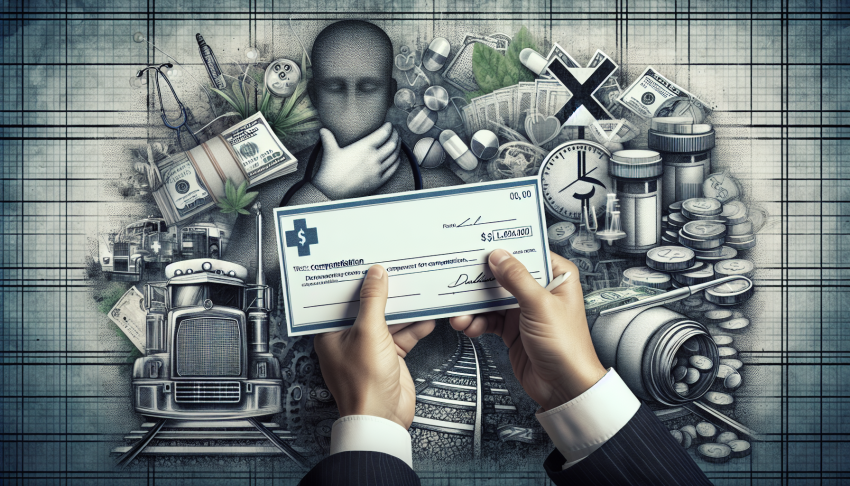
Economic Damages
Economic damages in train accidents typically include expenses for medical treatment, medications, and necessary medical devices. Furthermore, victims can receive compensation for lost income, as well as for the loss of future earning capacity resulting from the accident.
Economic damages also cover property damage and other financial losses directly resulting from the railroad crossing accident. It’s crucial to maintain records of all these expenses to build a solid case for compensation.
Non-Economic Damages
Non-economic damages compensate for losses that cannot be easily quantified financially. These may include:
- Compensation for pain and suffering
- Mental anguish
- Disability
- Diminished quality of life
- Emotional distress
Emotional distress suffered by victims, which forms a part of non-economic damages, acknowledges the psychological impact and trauma endured as a result of the railroad crossing accident. It’s a recognition of the emotional and psychological burden carried by victims, even long after their physical injuries have healed.
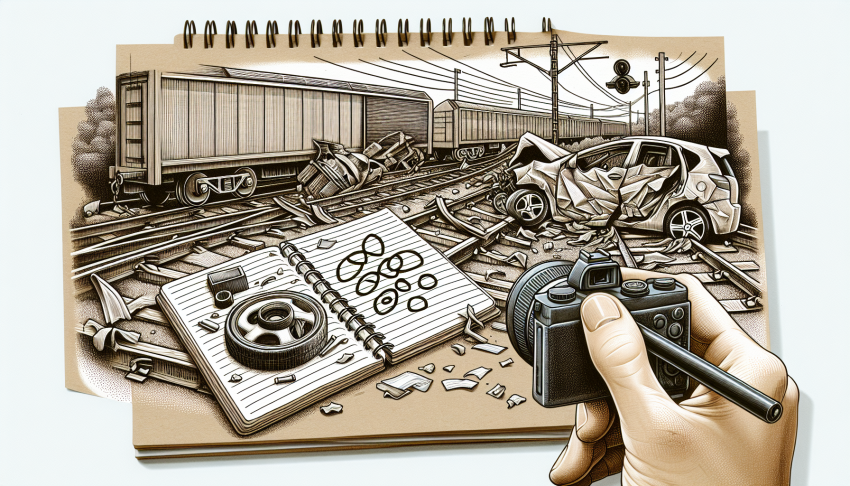
Steps to Take After a Railroad Crossing Accident in Georgia
After a railroad crossing accident, there are several crucial steps victims should take:
- Seek immediate medical care to ensure that any injuries are properly assessed and treated.
- Document the scene as thoroughly as possible, including taking photos and gathering witness statements.
- Inform authorities and railway personnel about the accident.
- Maintain records of all expenses related to the accident, including medical bills, property damage, and lost wages.
- Contact an experienced Georgia railroad crossing accident attorney to help navigate the legal process and seek compensation for your injuries and damages.
Seeking Medical Attention
Immediately after a railroad accident, victims should:
- Obtain medical care to address potential internal injuries or issues caused by shock and adrenaline that may not be immediately noticeable.
- Communicate all symptoms to the medical provider, including any cognitive issues.
- Maintain a log of how the accident continues to impact daily life.
Victims of train accidents must promptly seek medical assistance, comply with all given medical advice, and keep detailed records of treatments and any medications prescribed. Selecting a medical provider who specializes in treating accident-related injuries is crucial in receiving proper care and in managing future medical expenses.
Documenting the Scene
Documenting the accident scene with photos or videos should cover various aspects, including any sight obstructions, and include aerial photos if possible to provide an overview of the site conditions. In incidents where there is no collision, evidence may still be available such as internal reports, security footage, witnesses’ statements, and information from social media posts.
Furthermore, efforts should be made to gather contact details from witnesses at the scene of the accident. Their accounts may provide valuable insights during the investigation and legal processes, making it crucial to document their accounts accurately and comprehensively.
Contacting a Lawyer
After a railroad crossing accident, contacting an experienced railroad accident lawyer is crucial. Lawyers at Scholle Law can provide assistance in the following areas:
- Evidence collection and investigation
- Studying the details of a railroad crossing case
- Clarifying any questions
- Identifying the best options for forwarding a claim
Their specific experience in train accident cases makes them well-equipped to handle your case.
Affected individuals should contact a personal injury lawyer like Scholle Law with experience in train accidents without delay for legal advice on insurance and litigation matters. The sooner an experienced lawyer is involved in the case, the better your chances of receiving the compensation you deserve.
Summary
In the wake of a railroad crossing accident, the journey to recovery is often fraught with legal complexities, emotional trauma, and financial strain. However, with the guidance of an experienced railroad accident lawyer, victims can navigate the legal landscape more confidently, secure in the knowledge that their rights will be protected and their interests advocated for.
The aftermath of a railroad crossing accident is undoubtedly challenging, but remember, you don’t have to face it alone. At Scholle Law, we’re here to help you every step of the way, from investigating the accident and determining liability to negotiating for the compensation you deserve. Don’t hesitate to reach out to us for a free consultation today – because you matter, and your recovery matters.
Frequently Asked Questions
What is the code 40 6 140 in Georgia?
In Georgia, code 40-6-140 requires drivers to stop 15-50 feet away from railroad tracks when necessary, as some railroad crossings may not have limit lines to indicate the stopping point. This law aims to ensure safety at railroad crossings.
What is the law for reporting an accident in Georgia?
In Georgia, you are legally obligated to report your car crash if it resulted in injuries to anyone, no matter how minor or serious, or in the death of someone.
How much do accident lawyers charge in Georgia?
Accident lawyers in Georgia typically charge a contingency fee of 33.3% to 40% of your settlement or award, with no upfront cost to you. It’s important to note that you only pay if you win your case.
What are the common causes of railroad crossing accidents in Georgia?
Railroad crossing accidents in Georgia are commonly caused by equipment failure, human error, and poor maintenance. Be cautious and follow safety procedures to avoid accidents.
